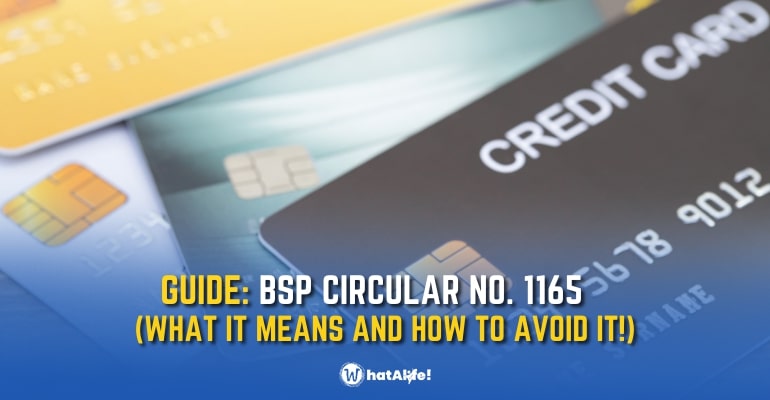Estimated reading time: 5 minutes
Bangko Sentral ng Pilipinas (BSP) has recently released a change to the Manual of Regulations for Non-Bank Financial Institutions (MORNBFI) and the Manual of Regulations for Banks (MORB). The amendment was known as the BSP Circular Number 1165. Here’s what you need to know, plus a few other tips.
Table of contents
BSP CIRCULAR NO. 1165
The subject of this amendment is changing the interest ceiling or finance charges for Credit Card receivables. The changes stated are as follows:
Section 1. Section 312 of the MORB is therefore amended as follows:
Method of computing and imposition of interest or finance charges. Banks shall impose an interest or finance charge on all credit card transactions not to exceed an annual interest rate of thirty-six (36%), except credit card installment loans which shall be subject to a monthly add-on rate not exceeding one percent: Provided, That in the case of credit card cash advances, aside from the foregoing applicable maximum interest rate caps, no other charge or fee shall be imposed or collected apart from the processing fee in the maximum amount of Php200.00 per transaction; Such maximum processing fees and interest rates or finance charges shall be reviewed by Bangko Sentral every six (6)months.
In summary, Bangko Sentral changed the MORB so that the previous annual interest rate for credit card transactions is increased to 36% or 3% monthly. The same amendment was also applied to the MORNBFI, affecting financial institutions that offer credit card services.
For credit card users that frequently take cash advances, the processing fee will remain at Php 200 per transaction. This new amendment will be applied to banking institutions and credit card issuers on February 10, 2023, 15 working days after publication, last January 19, 2023.
Why was the interest rate increased?
Due to high inflation, Bangko Sentral’s Monetary Board calculated that an increase of 3% in credit card interest is needed to lessen the pressure of inflation on banks and financial institutions. The increase is also aimed at promoting process improvements, upgrading IT systems, and strengthening the cyber security of the nation’s financial institutions.
Bangko Sentral stated that credit card loans increased by 26.5% when the nation’s economy reopened after the pandemic. However, the increase in loans also increases the risk for financial institutions if credit card holders cannot pay their debts. Therefore, this increase also acts as a stop-gap to reduce this uncertainty.
To lessen the impacts of the increase, the monetary board will introduce the price hike successively. This is to keep the price of owing credit cards manageable without risking the long-term viability of credit cards. Credit card owners are advised to start paying credit debts before the subsequent increase to avoid financial troubles.
Frequently Asked Questions
Will the new interest rates apply only to transactions starting from February 10, 2023?
No. The increase in interest rates will also apply to unpaid credit card balances when February 10, 2023, arrives.
Will cash advance transaction interest rates also increase?
Yes, the cash advance rate increase will also come into effect on February 3, 2023. However, the Php 200 processing fee will stay the same.
Will this also affect the annual interest rate of my installments?
There will be no change in annual interest for installment transactions.
The fees disclosed during the installment transaction shall apply for the entire term. In addition, zero percent installment plans will remain if you stick to paying the total amount due before the payment due date.
If my next payment is beyond February 10, will the fee have a three percent interest?
No, your interest rate before February 10 will remain at two percent. After that, the three percent interest rate will then be applied.
For example, if you have a credit balance of Php 20,000 due on February 23, two percent interest will be Php 226.67 (from January 24 to February 9). Then, from February 10 to 23, your interest will be Php 280.00. Thus, your overall Statement of Account Interest charge for your unpaid Php 20,000 balance is Php 506.67.
See the example provided by CitiBank below:
Tips on How to Avoid or Lessen High Credit Card Interest Rates
Tip #1. Pay Your Monthly Balance
Every month, the credit card holder will receive a bill showing the holder’s transactions and stating the minimum amount of payment needed and its due date. If you cannot pay the upcoming balance, you will incur interest, which will carry on to your next balance, increasing your overall debt and monthly payment.
Owning a credit card will also require a good credit score. Missing payments and paying late will reduce your credit score and will lead to a reduction of your credit card limit or revocation at worse.
All in all, simply make sure to pay your monthly balance, preferably in full, to avoid incurring interest.
Tip #2. Pay On Time
You might get a late fee if you’re late paying your monthly balance. Late fees will depend on your credit card issuer, but they can be a flat amount added to your existing balance or percentage based.
It might seem like a small amount initially; however, the total amount you’ll pay will increase significantly. So, choose to always pay on time. You may even set a monthly alarm/reminder to your phone to remind you of upcoming payments.
Tip #3. Be Smart On Your Spending
The best way to avoid high credit card debts is to not incur debt in the first place. Unfortunately, some people just can’t seem to stop spending when they have the means to do so.
So, if you still have some unpaid credits, control the urge to spend and splurge. Only spend when necessary and if you can afford it. Be smart and stay away from the temptations of sales! –WhatALife!/Vaughn
Source: (1), (2), (3), (4), (5)
Also read: WhatALife – Guide

Leave a Reply